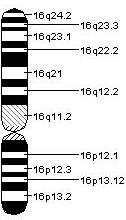Assessment |
Biopsychology |
Comparative |
Cognitive |
Developmental |
Language |
Individual differences |
Personality |
Philosophy |
Social |
Methods |
Statistics |
Clinical |
Educational |
Industrial |
Professional items |
World psychology |
Biological: Behavioural genetics · Evolutionary psychology · Neuroanatomy · Neurochemistry · Neuroendocrinology · Neuroscience · Psychoneuroimmunology · Physiological Psychology · Psychopharmacology (Index, Outline)
Chromosome 16 is one of the 23 pairs of chromosomes in humans. People normally have two copies of this chromosome. Chromosome 16 spans about 90 million base pairs (the building material of DNA) and represents just under 3 % of the total DNA in cells.
Identifying genes on each chromosome is an active area of genetic research. Because researchers use different approaches to predict the number of genes on each chromosome, the estimated number of genes varies. Chromosome 16 probably contains between 850 and 1,200 genes.
Genes[]
The following are some of the genes located on chromosome 16:
- ABCC6: ATP-binding cassette, sub-family C (CFTR/MRP), member 6
- CREBBP: CREB binding protein (Rubinstein-Taybi syndrome)
- COQ7: ubiquitin biosynthesis
- GAN: giant axonal neuropathy (gigaxonin)
- LITAF: lipopolysaccharide-induced TNF factor
- MEFV: Mediterranean fever
- PKD1: polycystic kidney disease 1 (autosomal dominant)
- TAT: tyrosine aminotransferase
- TSC2: tuberous sclerosis 2
Diseases[]
The following diseases are some of those related to genes on chromosome 16:
- Charcot-Marie-Tooth disease
- Charcot-Marie-Tooth disease, type 1
- familial Mediterranean fever
- giant axonal neuropathy
- polycystic kidney disease
- pseudoxanthoma elasticum
- Rubinstein-Taybi syndrome
- tuberous sclerosis
- tyrosinemia
References[]
- Gilbert F (1999). Disease genes and chromosomes: disease maps of the human genome. Chromosome 16. Genet Test 3 (2): 243-54. PMID 10464676.
- Martin J, Han C, Gordon LA, Terry A, Prabhakar S, She X, Xie G, Hellsten U, Chan YM, Altherr M, Couronne O, Aerts A, Bajorek E, Black S, Blumer H, Branscomb E, Brown NC, Bruno WJ, Buckingham JM, Callen DF, Campbell CS, Campbell ML, Campbell EW, Caoile C, Challacombe JF, Chasteen LA, Chertkov O, Chi HC, Christensen M, Clark LM, Cohn JD, Denys M, Detter JC, Dickson M, Dimitrijevic-Bussod M, Escobar J, Fawcett JJ, Flowers D, Fotopulos D, Glavina T, Gomez M, Gonzales E, Goodstein D, Goodwin LA, Grady DL, Grigoriev I, Groza M, Hammon N, Hawkins T, Haydu L, Hildebrand CE, Huang W, Israni S, Jett J, Jewett PB, Kadner K, Kimball H, Kobayashi A, Krawczyk MC, Leyba T, Longmire JL, Lopez F, Lou Y, Lowry S, Ludeman T, Manohar CF, Mark GA, McMurray KL, Meincke LJ, Morgan J, Moyzis RK, Mundt MO, Munk AC, Nandkeshwar RD, Pitluck S, Pollard M, Predki P, Parson-Quintana B, Ramirez L, Rash S, Retterer J, Ricke DO, Robinson DL, Rodriguez A, Salamov A, Saunders EH, Scott D, Shough T, Stallings RL, Stalvey M, Sutherland RD, Tapia R, Tesmer JG, Thayer N, Thompson LS, Tice H, Torney DC, Tran-Gyamfi M, Tsai M, Ulanovsky LE, Ustaszewska A, Vo N, White PS, Williams AL, Wills PL, Wu JR, Wu K, Yang J, Dejong P, Bruce D, Doggett NA, Deaven L, Schmutz J, Grimwood J, Richardson P, Rokhsar DS, Eichler EE, Gilna P, Lucas SM, Myers RM, Rubin EM, Pennacchio LA (2004). The sequence and analysis of duplication-rich human chromosome 16. Nature 432 (7020): 988-94. PMID 15616553.
| Human chromosomes |
|---|
|
{1} {2} {3} {4} {5} {6} {7} {8} {9} {10} {11} {12} {13} {14} {15} {16} {17} {18} {19} {20} {21} {22} {X} {Y} |
fr:Chromosome 16 humain hu:Humán 16-os kromoszóma pt:Cromossoma 16 (humano) sr:Хромозом 16 (човек)
| This page uses Creative Commons Licensed content from Wikipedia (view authors). |
